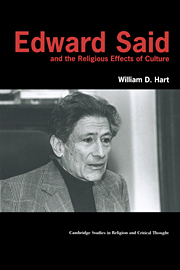Book contents
- Frontmatter
- Contents
- Preface
- Abbreviations
- Preliminary remarks
- 1 Culture as the transfiguration of religious thought
- 2 The religious effects of culture: nationalism
- 3 The religious effects of culture: Orientalism
- 4 The religious effects of culture: imperialism
- 5 The responsibilities of the secular critic
- 6 Marx, Said, and the Jewish question
- Concluding remarks: religion, secularism, and pragmatic naturalism
- Appendix A Whose exodus, which interpretation?
- Appendix B An exchange of letters between Michael Walzer and Edward Said
- Notes
- Select bibliography
- Index of names
5 - The responsibilities of the secular critic
Published online by Cambridge University Press: 22 September 2009
- Frontmatter
- Contents
- Preface
- Abbreviations
- Preliminary remarks
- 1 Culture as the transfiguration of religious thought
- 2 The religious effects of culture: nationalism
- 3 The religious effects of culture: Orientalism
- 4 The religious effects of culture: imperialism
- 5 The responsibilities of the secular critic
- 6 Marx, Said, and the Jewish question
- Concluding remarks: religion, secularism, and pragmatic naturalism
- Appendix A Whose exodus, which interpretation?
- Appendix B An exchange of letters between Michael Walzer and Edward Said
- Notes
- Select bibliography
- Index of names
Summary
In “Speaking the Truth to Power,” the fifth of his six-part Reith Lectures, Representations of the Intellectual, Said poses the following question:
Is the intellectual galvanized into intellectual action by primordial, local, instinctive loyalties – one's race, or people, or religion – or is there some more universal and rational set of principles that can and perhaps do govern how one speaks and writes? In effect I am asking the basic question for the intellectual: how does one speak the truth? What truth? For whom and where?
(RI 8)Said has always been something of a Trojan horse in the poststructuralist–postmodernist city. This passage is only one place among many where he expresses his suspicion of those who are suspicious of truth, of those who describe themselves as poststructuralist or postmodernist. Said is a high modernist, who is neither poststructuralist nor antipoststructuralist. He is ambivalent – an in-house critic, an exiled admirer. While skeptical of naïve notions of truth he is equally skeptical of the notion that truth is “endlessly deferred” or the notion that truth and power are the same thing or that the former is a mask for the latter. By proposing to speak truth to power, Said signals his rejection of a particular epistemological and ethical construction of truth, where Descartes' certainty and Nietzsche's radical skepticism are two sides of a single misunderstanding.
- Type
- Chapter
- Information
- Edward Said and the Religious Effects of Culture , pp. 116 - 142Publisher: Cambridge University PressPrint publication year: 2000

